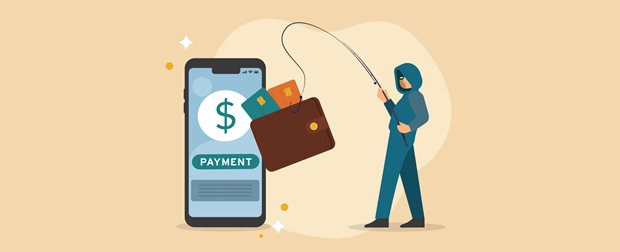Text. Phone call. Email. Social media DMs.
The days of harmless prank phone calls asking if your refrigerator is running are over. Instead, you may get a phone call from the IRS saying a warrant is out for your arrest. Or, you might get an email saying you’ve been hacked — sent by hackers. It can be challenging for anyone to assess hack threats, and the sheer number of them being sent on any given day can be wildly frustrating.
While scams and fraud are as old as human relationships, the rapid pace of technology has made them easier than ever for scammers and more challenging for folks to know what’s legit.
These claims are being made by hackers and scammers using reputable names, and they have gotten very good at mimicking emails, phone numbers, and other collateral. In the case of a phone call or text, your caller ID or contacts may even register that the call is coming from a software giant. This could be a fake representative spoofing the number, so it appears to come from a trusted source.
The scammer may be trying to gain access to your computer or personal information — not to help you, but to take control of your device, get your personal information, or access accounts.
In all these scenarios, it takes a careful assessment to decide if it’s authentic. Spoofed numbers make it appear that a call or text is coming from a trusted source, and emails and pop-ups look legit.
We’ve rounded up seven common scams to help stop a hack before it starts.
Threat 1: Someone posing as tech support
You may receive a phone call, pop-up notification on a device, or email purporting to be from Norton, Microsoft, Apple, or another well-known tech company.
The outreach can say you’re ready for a renewal or have an overdue invoice, or there’s a new service or product available. All these companies are trusted, and you may even be using their antivirus software, email tools, or other products on your devices.
They will make claims — e.g., that as your electronic device has a virus, your device security subscription has been automatically renewed, or you have been charged for services you did not receive or ask for. They will try to persuade you to give remote access to your device to fix the issue, and will sometimes even ask for immediate payment.
Threat 2: Someone posing as legal authority
You receive an unexpected phone call from someone claiming to be a police officer, U.S. Marshall, U.S. Customs and Border Protection, toll road system or service, some other kind of government official, or an attorney with legal authority.
The caller may use the real names of government entities and even police officers. When you answer the call or check your messages, you’re told you missed a court date, haven’t responded to a lawsuit, or have an unpaid fine, or that a warrant has been issued for your arrest.
When you engage, urgent payment is demanded to make the problem go away. You may be asked for your credit, debit, or bank routing numbers to initiate a wire transfer or even purchase gift cards to pay off the fine for whatever perceived “wrong” you’ve done.
These scams prey on people’s fears of getting in trouble. Some people will quickly opt to take action when put at risk of potential and immediate legal action. Unfortunately, payment does not solve the supposed problem, and the scammer keeps calling.
Threat 3: Someone saying you’ve won a prize
You get a notification by phone, email, or mail that you won a prize or a quantity of money, sometimes for a contest you didn’t even enter. The notification may often use a legitimate sweepstakes name, like Publishers Clearing House. A variation of this scam is someone claiming they’ve won a large prize and have decided to share it with commenters on a post or people who reply to a text.
How exciting, right? Unfortunately, these scams prey on this excitement. In some cases, you will even receive a realistic-looking check in the mail — but come to find out it is fake.
A fake check that isn’t worth anything is a significant disappointment, but how does that turn into a hack? Once you receive it, you may be instructed to pay fees and give your financial and personal information to claim your prize. The scammer will either ghost you and stop replying once they get the information or money, or begin to ratchet up the ask, demanding more money to cover bank costs, transfer fees, insurance, delivery of the prize, lawyers fees to transfer the funds, or any number of fraudulent claims.
Threat 4: Someone posing as an online buyer/seller
From tickets to in-demand concerts to designer clothing at a ridiculously low price to even mundane household objects — online sales can be too good to be true. Fake websites or phony listings on sites like Facebook Marketplace and Craigslist draw you into a purchase that ends up with you paying and no goods or services being exchanged. Orders are never fulfilled, cards are charged multiple times, or you receive an item that looks or performs nothing like what was promised.
This scam can also appear in online rental listings. You may be asked for a security deposit before seeing a space or signing a lease. A property may be legitimately for rent, but someone scams you into thinking they have the power to lease it for a discount or a great price.
Scams can also happen when a buyer offers well over the selling price for an item. The fake buyer sends a fake check or pays with a fraudulent credit card and asks you to advance funds to another fake vendor, causing you to be out of the funds.
Threat 5: Someone posing as a Medicare representative
Scammers will call and pose as Medicare representatives to get your personal information and money. The scammers will state that they need your Medicare card number or Social Security number to keep your coverage active and verify medical information. The calls or counterfeit sales materials may claim that you can get a rebate, that coverage expires, or that you need to renew something.
Someone posing as an agent or representative may also try to upsell you to an additional, alternative, or premium service, like a prescription drug coverage plan, or convince you to purchase other services or goods presented as deals or offers specifically for Medicare recipients.
For one, there are no Medicare sales representatives, so you will never be called by the Centers for Medicare and Medicaid Services (CMS). Prescription drug coverage plans, called Medicare Part D, are entirely optional, and enrolling or not enrolling in one cannot terminate your benefits.
These scams target vulnerable seniors afraid of losing essential medical coverage. While they happen all year long, there is an uptick in efforts during Medicare open enrollment between October and December each year.
Threat 6: Someone saying your auto warranty is expired
You receive a call or mail from fake representatives of auto dealers, manufacturers, and insurance companies trying to convince you to renew your auto warranty or insurance or claiming your warranty is expired.
It may start out with a robocall. You’ll be instructed to press a number or stay on the line for a representative who seems real. When contacted by these scammers, you may be asked for personal information about yourself and your vehicle or financial information to pay off this fake claim.
Scams can include actual products that aren’t warranties, but service contracts — and they don’t cover much thanks to fine print restrictions or are exorbitantly priced. We’ve also seen plenty of reports of SMS texts or social media direct messages about extended warranty coverage that turn out to be scams, as well as people going door to door.
Threat 7: Someone saying there is a family emergency
The scariest call to receive is someone you love saying they are in trouble. Scammers know this; they know you’d do anything to help and protect your friends and family, including sending money urgently.
Scammers can pose as someone you trust who is in an emergency to convince you to send them money. It may be a Facebook post that a loved one is stranded, a phone call that someone has been kidnapped, or a text to send a credit card number to get a loved one out of a jam. You may get a request to buy many gift cards and send the card numbers and PINs as quickly as possible. By playing on a sense of urgency, scammers hope they’ll convince you to act first and think it through later.
What’s more, these scammers pose as grandchildren, friends, relatives, and close contacts, and seem like the real deal. Through artificial intelligence (AI), voices can be cloned, so you cannot tell the difference.
The scam may end once you’ve sent a sum of money. But there may be further demands. After the initial call, you may be told a lawyer, parole officer, or courtroom may contact you for details. Those follow-up calls are also scammers, extending the fraud while further preying on your fears.
What you can do to fight back against common scams
Now that you know the seven common scams we’re seeing, here are seven things you can do to protect yourself. An ounce of scam protection is worth a pound of cure!
- Hang up, block, erase, and ignore! If you need to know if a call, email, or mailing is legitimate, contact the business, organization, or entity directly at a number, email, or address you trust.
- Don’t click links or open email attachments until you’ve verified the sender. Check the sender’s full email address against legitimate communications you’ve received.
- Check the URLs included in communications — don’t just click a link to a site that says it’s Apple or Microsoft.
- Report suspected frauds and scams to the FTC at ReportFraud.ftc.gov. Contact your state attorney general and your local consumer protection office to report suspected scams.
- Report suspected Medicare scams to 1-800-MEDICARE (1-800-633-4227).
- When shopping online, use a credit card that offers fraud protection. Paying in cash, Zelle®, or some payment apps can remove protections.
- When selling online, ensure that you’ve received payment in full before transferring goods or performing services.







